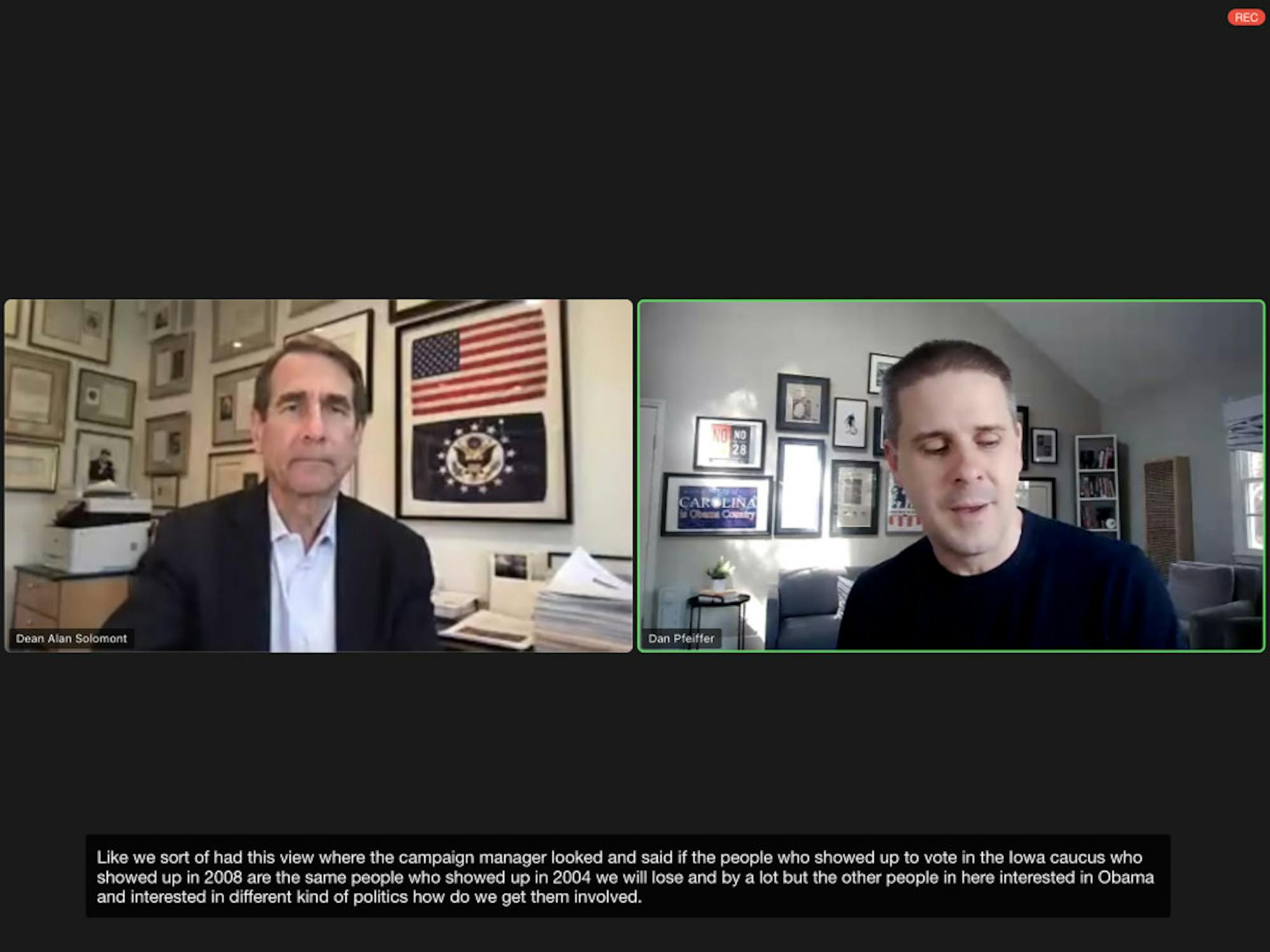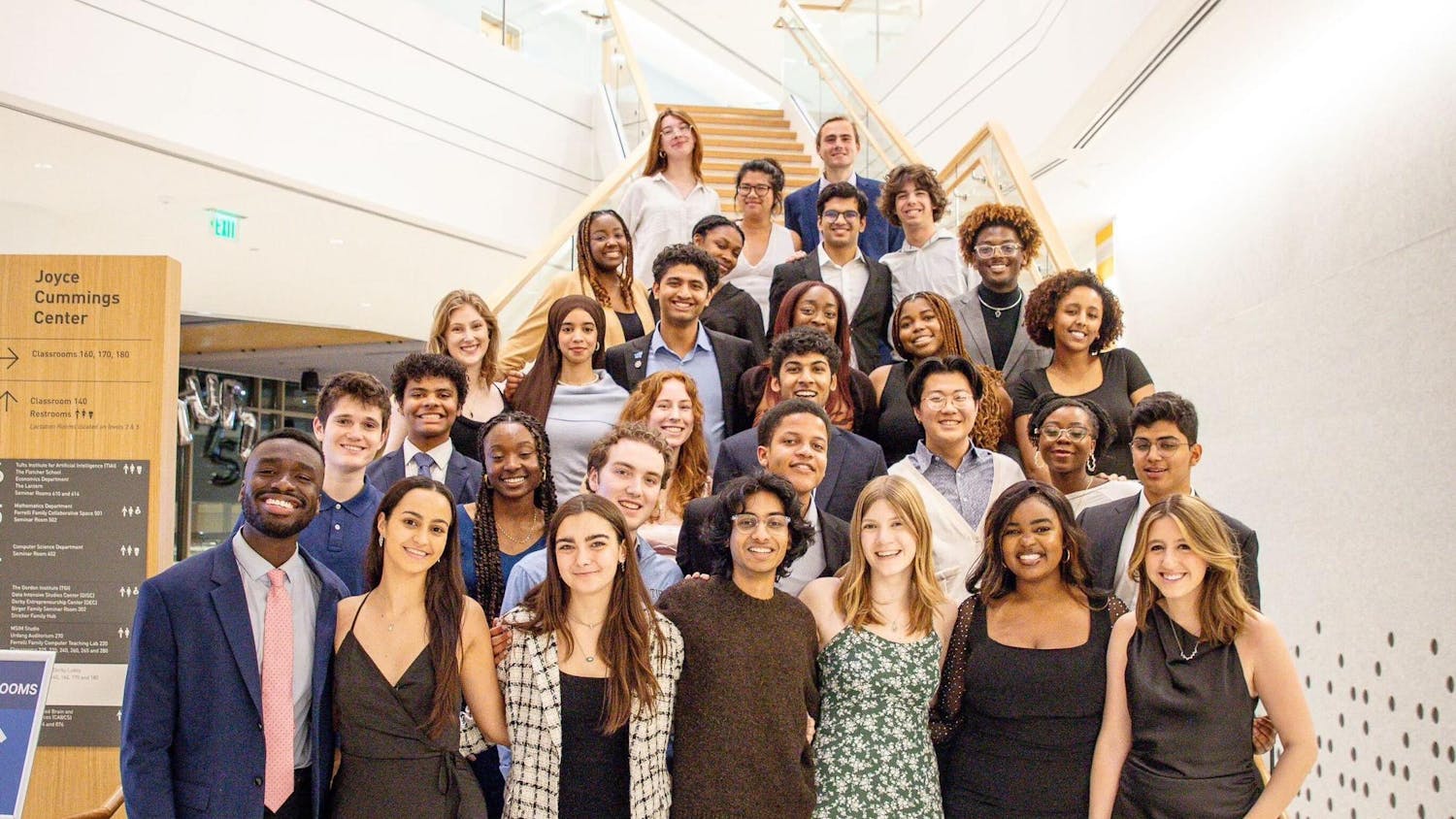The Jonathan M. Tisch College of Civic Life hosted Dan Pfeiffer on April 21 in the latest event in its Distinguished Speaker Series. Pfeiffer is a political communication strategist, author and a co-host of the progressive "Pod Save America" podcast. He served as White House director of communications and later as a senior advisor to former president Barack Obama.
Jen McAndrew, director of communication strategy and planning at Tisch College, gave opening remarks and revealed Tufts students’ long-running interest in Pfeiffer’s feature.
“Over the past four years since the launch of their blockbuster podcast, we have received many requests from Tufts students to bring the "Pod Save America" hosts to campus as part of this speaker series, and we are so pleased to deliver on that request, virtually, today," McAndrew said.
Tisch College Dean Alan Solomont opened the discussion by bringing up President Biden's response to the recent Derek Chauvin verdict in the landmark George Floyd case.
“The jury handed down a verdict of guilty on all three counts in the death of George Floyd," Solomont said. "Speaking about the verdict President Biden said, 'This can be a giant step in the march toward justice ... But it is not enough, it can't stop here.' What should the president do to ensure that the march towards justice doesn't stop?”
Pfeiffer responded by citing new investigation efforts into policing at the Minneapolis Police Department.
“The first thing is that Merrick Garland, the newly confirmed Attorney General of the United States, has announced that he's going to do a pattern and practice investigation into the Minneapolis Police Department," Pfeiffer said. "That is something that is one of the most important things to do to figure out what has happened there and make sure that this is not just about George Floyd, it's about how you ensure that we make policing better and safer."
He also mentioned a police reform bill that has gained renewed urgency following Chauvin's conviction.
“The most important thing is something that the president talked about in the phone call he had with the Floyd family that went somewhat viral yesterday," Pfeiffer said. "There is a piece of legislation, the [George Floyd Justice in Policing Act], that is before Congress. It passed the house in 2020, it was blocked in the Senate … There is some reporting this afternoon that bipartisan negotiations have actually kicked off again for the first time in a long time.”
Pfeiffer also discussed his past work with communications for the Obama administration, which started with his involvement in media initiatives to promote communication with certain groups during his campaign.
“The challenge you have from a communications perspective is the people that we needed to get involved: young people, people who had sort of checked out of politics during the Bush years," Pfeiffer said. "They are the people who paid the least amount of attention to traditional news sources ... The view was we had to go to non-traditional places to put Barack Obama in front of people we had to bring into the process to win."
When asked about his advice to students who are interested in journalism and the field of political communications, Pfeiffer emphasized the importance of strong writing and argumentation skills.
“What was most useful wasn't necessarily what might be actionable facts that I learned in American government," Pfeiffer said. "It was learning to make an argument, in writing and orally, to synthesize things, and be able to do that clearly and concisely and persuasively."
He explained how the development of these skills can translate into a student’s performance in the workforce.
“Your first job's going to be entry level, you're going to start answering phones, and then someone's going to say write something, can you draft this, and if you are someone who can write something, all of a sudden you're going to get to write more stuff," Pfeiffer said. "So I think really thinking about how to become a good writer, is the best way to break into political communications and then succeed in it.”
Pfeiffer also shared his thoughts on President Joe Biden’s State of the Union address and what the President's message should be.
“For President Biden, what I think he should do and I believe he will do, is to try to connect his agenda — the American Rescue Plan that was passed, the American Jobs Plan, which is often described and debated as his infrastructure plan and associated things with it, his efforts to get people vaccinated ... to the larger message of unity that he had in the campaign that got him elected,” Pfeiffer said.
Solomont asked Pfeiffer how the focus of the podcast, founded in 2017, will change under a new president.
"I think the biggest challenge for Democrats over the next year and a half is keeping the people who got involved because of Donald Trump involved in politics," Pfeiffer said. "Because Trump is gone, the threat is not gone ... We want to continue to help people understand what's happening ... We also want to shine a light on the threat that still exists and keep people involved for 2022."
Solomont facilitated questions from the audience, which Pfeiffer answered, to round out the event.






